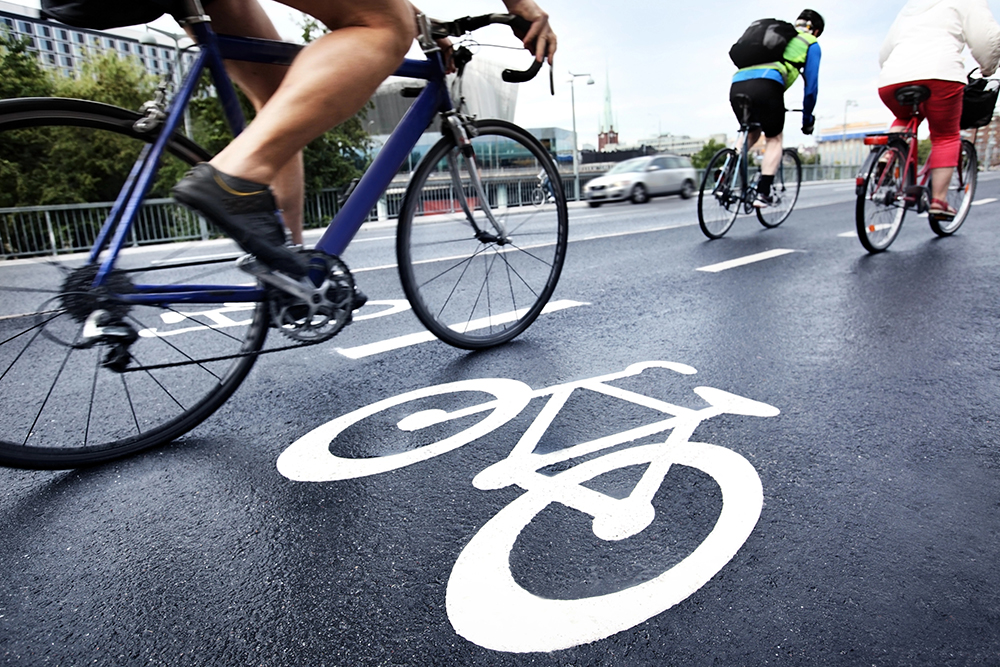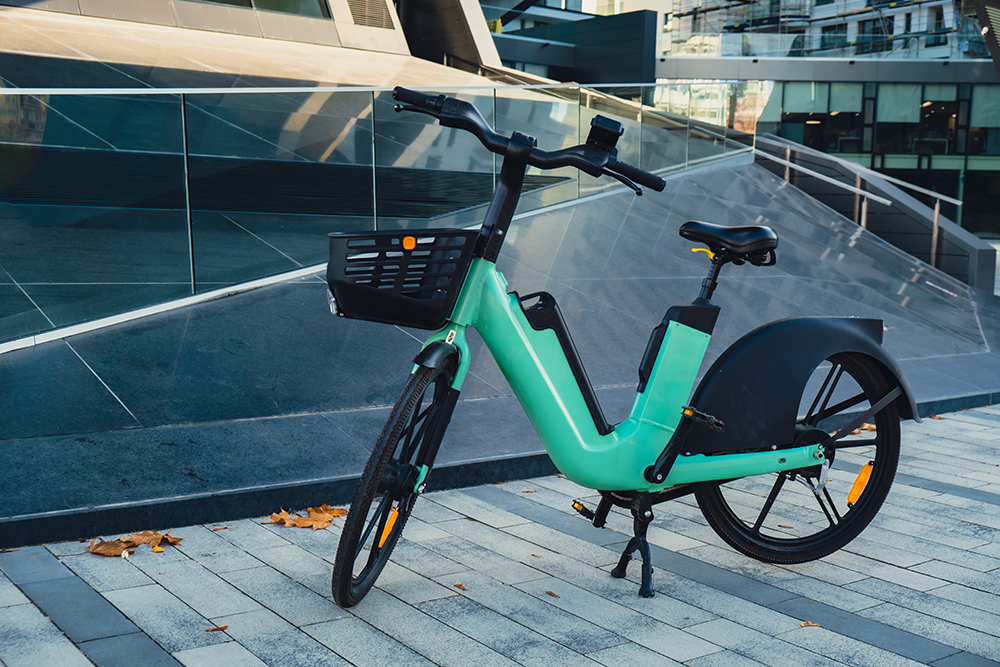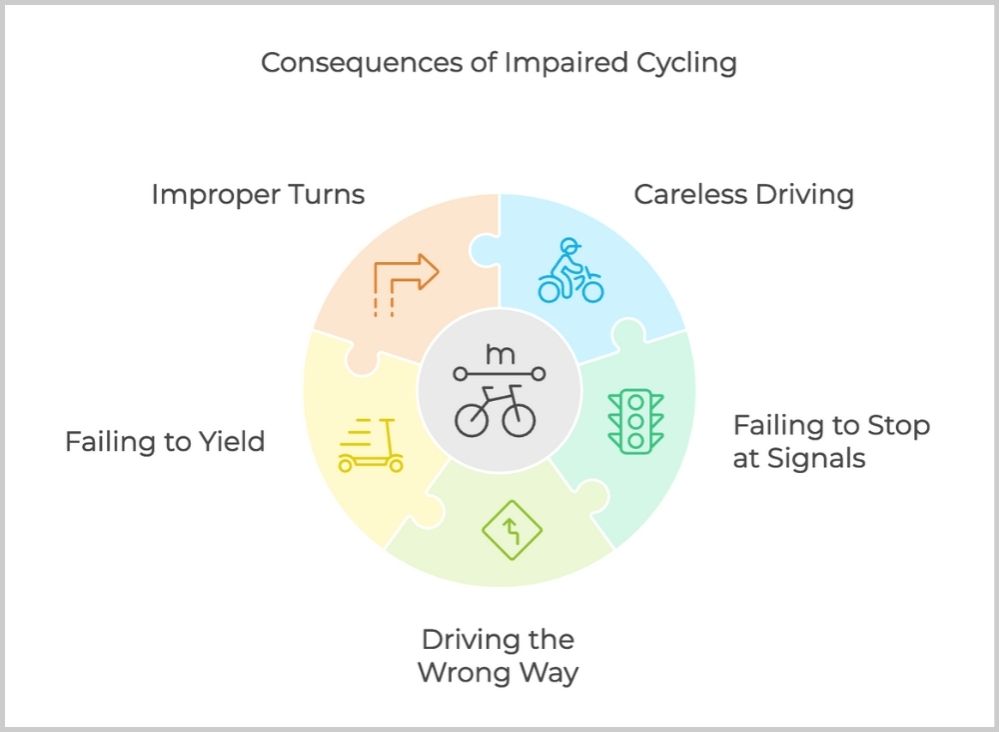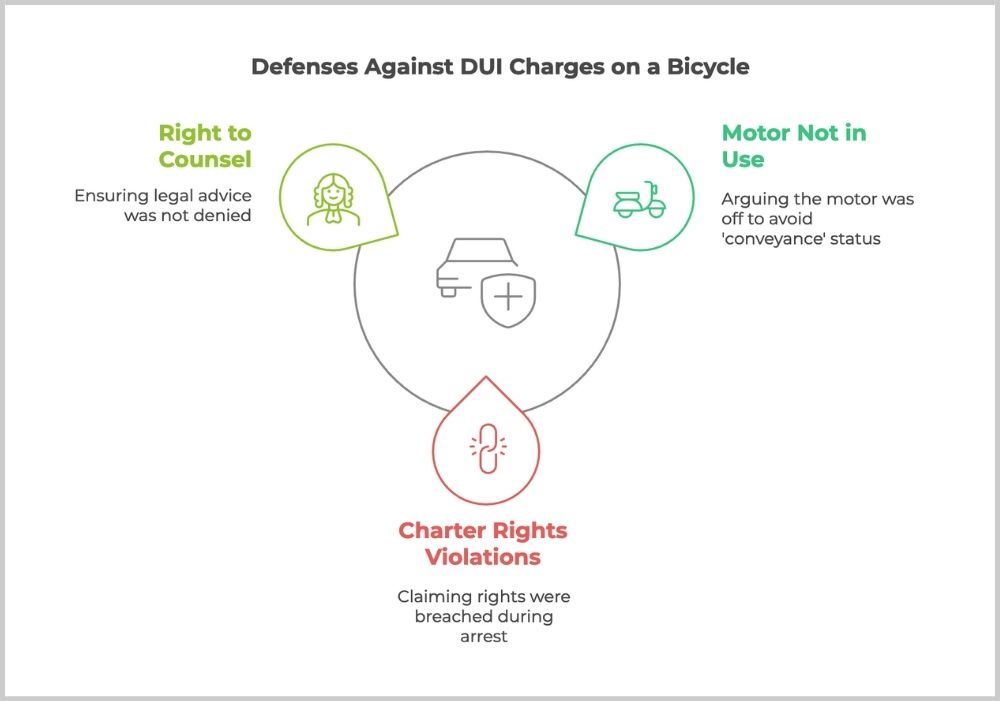Can You Get a DUI Riding a Bike in Canada?
Last Updated: October 20, 2023
When you think of DUIs, your brain automatically turns to vehicles. However, with summer in full swing, it raises the question: can you get a DUI riding a bike? Not to sound like a stereotypical lawyer, but it depends. In short, if your bike has a motor, then you can be subject to criminal DUI charges, as well as lesser criminal and provincial charges.
But what about classic road bikes that don’t have motors or peddling-assist devices? While riding a classic road bike home after drinks with friends may seem like the solution to a safe ride home, doing so is still dangerous, and you may face other charges, such as criminal negligence, careless driving, public intoxication, and other traffic offences.
To ride safely this summer, find out more about the world of DUIs and bicycles below.

Types of Bicycle Classifications
When most people think about bicycles, the typical peddle-your-heart-out bike comes to mind. In addition to the classic bike you likely grew up using, there are several kinds of bicycles, including:
- Road bikes
- Mountain bikes
- Tandem bikes
- Folding bikes
- E-bikes / motorized peddling-assist bikes
E-Bikes and Motorized Peddling-Assist Bikes
Unlike classic bikes, e-bikes or motorized peddling-assist bikes are equipped with an electric motor to assist the cyclist when peddling. For this reason, e-bikes and motorized peddling-assist bikes are treated differently than classic road bikes when it comes to DUIs.
Driving while impaired offences occur when a person has operated a conveyance while impaired by alcohol, drugs, or a combination of the two. Under section 320.11 of the Criminal Code, a ‘conveyance’ is defined as a “motor vehicle, a vessel, an aircraft, or railway equipment”.
With the presence of a motor, e-bikes or motorized peddling-assist bikes are considered a conveyance under the Criminal Code. As such, this classification of bicycles is subject to DUI charges under the Criminal Code.

Bicycle DUI offences across Canada
Classic Bikes
As classic road bikes do not have motors, they are not considered ‘conveyances’ under the Criminal Code. As such, regardless of where you are in the country, you cannot face DUI charges for cycling a road bike while impaired.
Nevertheless, that is not to say that you should do so. As shall be noted below, operating a bike while impaired is dangerous for yourself and those around you. Much like you would with a car, if you are unfit to cycle, you should arrange another ride home.
E-Bikes and Motorized Peddling-Assist Bikes
E-bikes and other motorized peddling-assist bikes are a different story. As this classification of bikes has motors, they are considered ‘conveyances’ under the Criminal Code. As such, they are subject to the same DUI offences as cars or other vehicles. Moreover, cyclists who bike while impaired may be charged with the following offences:
- Operation while impaired
- Operation causing bodily harm
- Operation causing death
- Over 80 mg
- Care and control
- Failure or refusal to comply with a demand, such as a breath sample
Other types of bicycle offences
Criminal Code
Criminal Negligence
Even if you do not receive DUI charges under the Criminal Code, you may face criminal negligence charges if you cause an accident. Under subsection 219(1) of the Criminal Code,
Criminal negligence
219 (1) Every one is criminally negligent who
(a) in doing anything, or
(b) in omitting to do anything that it is his duty to do,
shows wanton or reckless disregard for the lives or safety of other persons.
Cycling while impaired puts both yourself and those around you at risk. By cycling while impaired, you are demonstrating “wanton or reckless disregard for the lives or safety of other persons”. Thus, no matter the circumstances, you should never cycle while impaired.
Provincial Legislation
Even in the event that you do not face criminal charges for cycling while impaired, you may still face other charges under provincial legislation. While most bicycles may not be motorized, they still share the roadway with others. Thus, you must still obey provincial traffic laws. For example, if you cycle while impaired, you may face a number of charges, some of which include:

- Careless driving
- Failing to stop at a stop sign or red light
- Driving the wrong way
- Failing to yield
- Improper turns
Careless Driving
Careless driving tends to be the lesser charge that Crown prosecutors seek if they cannot establish a DUI charge under the Criminal Code or if a plea bargain is struck. In the case of bicycles without motors, careless driving is the most severe charge that you can receive.
In addition to possible jail time, demerit points and licence suspension, fines for careless can be quite pricey regardless of which province you reside in. For example, the following are the careless driving fines in Ontario, Alberta and British Columbia:
- Ontario: $400-2,000;
- Alberta: $567 to $2,700;
- British Columbia: $368-$2,000.
More information on the penalties for careless driving can be found below.
Public Intoxication
In addition to provincial traffic offences, you are also subject to provincial liquor legislation. For example, you could receive a fine for public intoxication. Much like you can’t walk down the street drunk, you cannot cycle in public while impaired. Like careless driving, public intoxication will result in a set fine established by each province.
More information on the fine for your province can be found below.

What are the penalties and consequences of riding a bicycle while impaired?
Riding while impaired
Whether you are charged with operating a car or a bike while impaired, the penalties are the same. With every DUI conviction, the mandatory minimum penalties will increase. Regardless of whether you have previous DUI convictions, the following penalties will apply:
- Licence suspension
- Vehicle seizure and associated costs
- Participation in remedial or educational courses
For a first DUI offence, you will also receive a mandatory minimum fine of $1,000-$2,000, depending on the offence and your blood alcohol concentration (if applicable).
For a second DUI offence, you will also receive a mandatory minimum jail sentence of 30 days.
For a third DUI offence, you will also receive a mandatory minimum jail sentence of 120 days.
Criminal Negligence
The penalties for criminal negligence range depending on whether the negligence results in the bodily harm or death of another individual:
- Criminal negligence causing bodily harm: Maximum 10 years imprisonment;
- Criminal negligence causing death: Maximum life imprisonment.
In addition to possible jail time, you will receive a criminal record. Having a criminal record will impact your ability to gain and retain employment, as well as your ability to travel. If you are not a Canadian citizen, there may be immigration consequences as a result of a criminal conviction.
Careless Driving
Unlike Criminal Code DUI charges, careless driving is a provincial offence, meaning the penalties will vary by province. Nevertheless, your driving record will surely reflect the charge. The following are penalties for Ontario, Alberta and British Columbia as an example:
| Penalty | Ontario | Alberta | British Columbia |
| Fine | $400-$2,000 | $567-$2,700 | $368-$2,000. |
| Demerit Points | 6 | 6 | 6 |
| Licence Suspension | Mandatory for novice drivers
Possible 6 months suspension for all drivers |
Up to 2 years suspension | Up to 2 years suspension |
| Jail time | Possible 6 months | Possible 6 months | Possible 6 months |
Public Intoxication
While intoxication could lead to a number of alcohol-related offences, in the case of cycling while intoxicated, you may receive a citation for being a public space while clearly impaired by alcohol, drugs or a combination of the two. The fine will vary depending on which province you are in. As an example:
- Ontario: $50
- Alberta: $115
- British Columbia: $115
While the consequences for public intoxication are not as severe, that does not negate the danger you are placing yourself and others in. By riding while impaired, your awareness and reaction times will be impacted. As a result, you may cause an accident.
The roadways are not just for drivers and cyclists; pedestrians are all around and likely to be injured if you get into an accident with one due to your intoxication. While it is less likely for you to injure individuals in a car who are more fulsomely protected, you will have little to no protection on a bike. Even with a helmet, you may face serious injuries.
The moral of the story is that regardless of the lack of Criminal Code consequences in certain cases or the less severe penalties in the case of public intoxication, you should never drive while impaired.
What are the defences to riding a bicycle while impaired?

Motor Not in Use
If you are facing criminal DUI charges after riding a bicycle with a motor while impaired, your lawyer may seek to argue that the motor was not in use while you were operating the bike or at the time of the accident. The rationale behind this defence is that if the motor was not in use, then the bicycle cannot be considered a ‘conveyance’ under the Criminal Code. As criminal DUI charges are based on the premise that you were operating a ‘conveyance’ at the time of impairment, proving that the bicycle was not a conveyance is one possible defence.
In the event that this defence is not successful, you may seek to utilize other defences that would be common for DUIs with cars as the reasoning for these defences would still apply to bikes. One example might include a charter application when your rights have been violated during the course of the criminal investigation.
Charter Violation
Typically, your Charter rights kick in from the moment of your detention. However, some of your Charter rights are suspended during impaired driving road stops. Nevertheless, one or more of the following Charter rights may have been violated:
- Section 8: Right to be secure against unreasonable search and seizure
- Section 9: Right not to be arbitrarily detained
- Section 10(b): Right to counsel
- Section 11(b): Right to be tried within a reasonable time
Right to Counsel Violated
In the case of your right to counsel, immediately upon arrest, the police must inform the individual of their right to counsel and allow them to exercise that right. If the police did any of the following, then you may be able to exclude any evidence that they collected during the course of the transaction:
- Failure to Provide Rights: The police did not inform you of your right to counsel
- Delay in Providing Rights: The police waited too long to inform you of your right to counsel.
- Failure to Provide Opportunity to Exercise Rights: The police did not allow you to contact counsel.
- Delay in Providing Opportunity to Exercise Rights: The police waited too long to allow you to contact counsel.
The police cannot use any statements you make against you at trial before they inform you of your rights. However, they may use your statements to form the reasonable suspicion necessary to demand roadside tests.
FAQs
Is riding a bicycle while impaired a criminal offence?
It depends. If you are riding your classic road bike that doesn’t have a motor, then it is not a criminal offence to ride while impaired. Nevertheless, you should never cycle while impaired, as it is a risk to your safety and the safety of others.
However, if you’re riding an e-bike or a motorized peddling-assist bike, it will be a different story. As the bike is motorized, it qualifies as a ‘conveyance’ under the Criminal Code, meaning it is a criminal offence to ride a bike while impaired.
What is public intoxication?
Public intoxication is a provincial offence referring to when an individual is found to be intoxicated within a public space. The intoxication may be from alcohol, drugs or a combination of the two.
While it may not be a criminal offence to ride a bicycle when impaired, if it does not have a motor, you may receive a citation for public intoxication. The fine for public intoxication will vary by province, but as an example:
- Ontario: $50
- Alberta: $115
- British Columbia: $115
What is criminal negligence?
Under subsection 219(1) of the Criminal Code:
Criminal negligence
219 (1) Every one is criminally negligent who
(a) in doing anything, or
(b) in omitting to do anything that it is his duty to do,
shows wanton or reckless disregard for the lives or safety of other persons.
While cyclists may not be subject to criminal DUI charges in some circumstances, there is still the possibility of criminal negligence charges. These might arise if the cyclist causes an accident as a result of their impairment.
Get A Free Consultation
"*" indicates required fields



